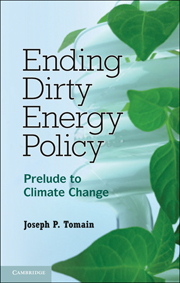Book contents
- Frontmatter
- Contents
- Preface
- Introduction
- 1 A Regulatory History of Dirty Energy Law and Policy
- 2 Protectionist Assumptions
- 3 The Next Generation Is Now
- 4 Consensus Energy Policy
- 5 Fossil Fuel Future
- 6 Electricity Future
- 7 Venture Regulation
- 8 Smart Energy Politics
- 9 Conclusion – Strategies for the Energy Future
- Notes
- Index
3 - The Next Generation Is Now
Published online by Cambridge University Press: 05 June 2012
- Frontmatter
- Contents
- Preface
- Introduction
- 1 A Regulatory History of Dirty Energy Law and Policy
- 2 Protectionist Assumptions
- 3 The Next Generation Is Now
- 4 Consensus Energy Policy
- 5 Fossil Fuel Future
- 6 Electricity Future
- 7 Venture Regulation
- 8 Smart Energy Politics
- 9 Conclusion – Strategies for the Energy Future
- Notes
- Index
Summary
[I]n our murderous yet also suicidal treatment of the environment, far more than greed and stupidity[,] [m]an is possessed of some obscure fury against his own remembrance of Eden.
Claude Levi-StraussThe decade of the 1970s brought the matter of energy policy to public consciousness and made regular headline news. The immediate precipitating events were the Arab and Iranian oil embargoes of that decade. Gasoline at the pump was rationed for the first time since World War II, oil prices quadrupled, inflation ensued, and a recession followed. The United States was seen as vulnerable to having its oil spigot cut off by Middle Eastern oil producers. Also at that time, our culture was experiencing a rising period of environmental consciousness. Combined, the forces of greater environmental awareness, energy vulnerability, and economic sensitivity gave rise to a series of energy policy studies that examined energy more strategically than we had in the past. Strategic energy studies are again in the news and have led to new approaches to how our country, and the world, should think about how to produce, distribute, and consume energy and how to handle its waste.
This chapter will examine the new energy thinking that began more than a generation ago. The next chapter will provide a set of more specific policy prescriptions that follow from the new thinking. To be sure, over the last generation, thoughts about energy policy have evolved. That evolution will be traced here.
- Type
- Chapter
- Information
- Ending Dirty Energy PolicyPrelude to Climate Change, pp. 65 - 91Publisher: Cambridge University PressPrint publication year: 2011
- 1
- Cited by



